Tag: history
Dispatch from the OHC Director, April 2020
From the OHC Director, April 2020
I’ve been thinking a great deal of late about what it means to live a life connected or disconnected or perhaps something in between. I suspect I’m not alone in pondering these states of being — a kind of remote engagement that itself feels a little bit like connection.
Oral history is about many things: listening, documenting, questioning, recording, explaining. I think connection is always key to the work that we do as oral historians. But like many other operations, including basically all non-medical research projects that involve humans, our work conducting interviews is largely shut-down while we consider how best to forge ahead.
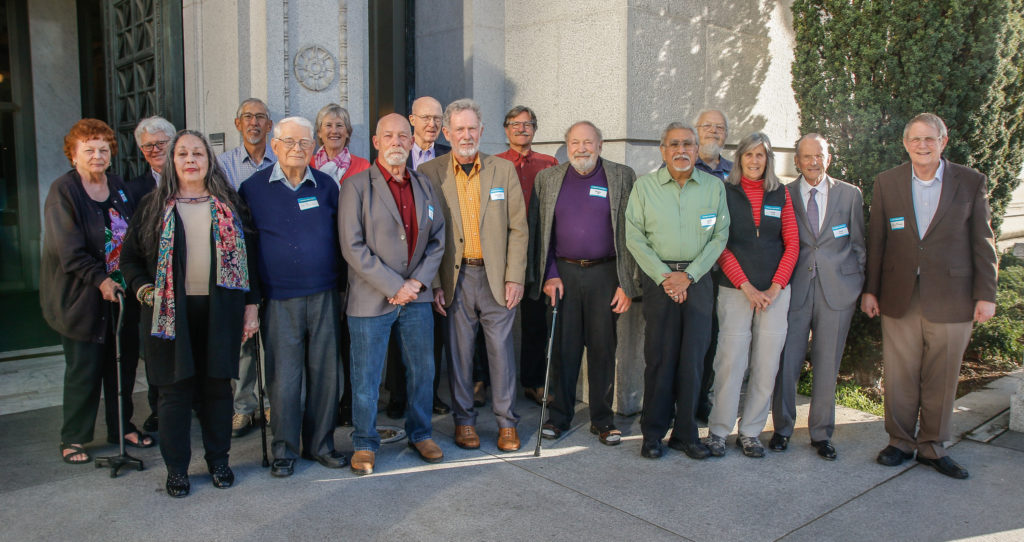
My colleagues and I have always valued the importance of the in-person, face-to-face interviewing experience. We regularly travel across the country at some considerable expense just so we can be in the same room with the person we are interviewing. We have found this time in close proximity with our narrators to be priceless. Not only does this allow us to shake hands, look eye-to-eye, and gauge body language just before and during the interview, but also these are practices that, until recently, have been second nature — we usually do them without thinking much about it. There really is an unconscious kind of dance that happens, especially when meeting someone for the first time, that in most instances results in a spontaneously choreographed fluidity that can carry the ensuring interview through fond memories and bad. Because of this, up to this point, only when it really was impossible to meet in person have we conducted an interview over the phone or online.
But times change. The current health crisis has profoundly rearranged social relationships, and likely for some time into the future. (Dr. Fauci even suggested that we rethink the practice of shaking hands, which, I’ll admit, makes me sad.) The Oral History Center staff have been scattered now for over a month. But we have endeavored to not lose touch with one another. Thanks to multifarious technological options, we have easily transitioned our weekly staff meetings online. We use either Google Hangouts or Zoom and, so far, everyone has used video, so we get to hear each other’s voices and see faces too. We sometimes have agenda items that require lengthy discussion, at other times we simply check in with each other about work but also about “how things are going.” We live in different settings so people have different challenges and we do our best to touch on those. I also chat every week with each of my colleagues individually and I’m very pleased to know that my colleagues have been meeting with each other, doing their best to push projects forward. The success of these virtual meetings, and, well, the zeitgeist, inspired me to set up virtual happy hours with friends and family. My family lives across the country and it’s been probably four years since we’ve been in the same room together but for the past two weeks we’ve all gathered online to check in, tell stories, have some laughs, get serious and, of course, get photobombed by various kids and dogs. We don’t escape the underlying gravity of the current situation, but this hasn’t stopped connection — in some real ways it has promoted it.
So, with this in mind, we are exploring the options for bringing our oral history back to life by bringing it online. We’re currently testing out various options for video and audio recording, paying close attention to everything from quality of recording to ease of use (considering that most people we interview don’t fit within the “digital native” demographic). We also are sensitive to the dimension of personal connection, rapport, and understanding, but given recent experiences “at” home and “in” the office, we have reason to be optimistic. The reasons for going online are not only about opportunity, they are much deeper and in some ways quite profound: every day, every month that passes, we lose an opportunity to interview someone who should have had the opportunity to tell their story. In fact, we just learned the very sad news that artist and advocate of Black artists, David Driskell, passed away due to complications from COVID-19. This was a man with a story to be told — and thankfully, with our partners at the Getty Trust, we conducted his oral history last year. We simply cannot wait out this epidemic and let it steal stories along with lives.
The second profound reason is related to something I’ve mentioned rather delicately here in the past: that the Oral History Center is a soft-money institution. What that means is we are basically a non-profit that earns its money (allowing us to do our work) by conducting interviews. The longer we are prevented from conducting oral histories, the more precarious our position becomes. We hope for but do not anticipate relief from the university, the state, or the federal government. All we want is to resume the good work of documenting our shared and individual experiences in times of growth and times of challenge — to continue the work that we’ve done for the past 66 years.
As we consider the path ahead, the Oral History Center staff continues to work vigorously albeit remotely. We’re finishing the production process on dozens of interviews that have been conducted already — that is, writing tables of contents, working with narrators on edits for accuracy and clarity, creating the final transcripts for bound volumes and open access on our websites. We continue to process original audio and video recordings so that they can be uploaded to our online oral history viewer. We’re writing blog posts about oral history and producing podcasts, including our newest and very topical season, Coronavirus Relief. Plus in addition to the regular work, we’re using this opportunity to focus on long desired projects: We’re creating curriculum for high schools; we’re writing abstracts for old interviews that never had them; and we’re using this time to think about new projects and write grant proposals so that when the time comes, we’ll be ready to go full steam ahead.
Check back here next month for more on our efforts to move oral history online. We’ll share our results publicly as many others are venturing into this domain too — and have themselves made important contributions to the conversation (I especially recommend checking out the free Baylor / OHA webinar on “Oral History at a Distance”). Until then, we sincerely hope that everyone this newsletter reaches stays safe, healthy, and able to remain connected to those who are important to you.
Martin Meeker, Charles B. Faulhaber Director, Oral History Center, The Bancroft Library
Trial access: Refugees, Relief, and Resettlement: Forced Migration and World War II
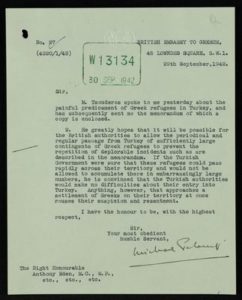 Until March 31, the Library has trial access to Refugees, Relief, and Resettlement: Forced Migration and World War II, which “chronicles the plight of refugees and displaced persons across Europe, North Africa, and Asia from 1935 to 1950, bringing together over 650,000 pages of pamphlets, ephemera, government documents, relief organization publications, and refugee reports that recount the causes, effects and responses to refugee crises before, during and shortly after World War II.” The records are sourced from the foreign and colonial office files in the U.K. National Archives, the U.S. State Department from the National Archives Records Administration, the British India office collection from the British Library, and the archives of World Jewish Relief.
Until March 31, the Library has trial access to Refugees, Relief, and Resettlement: Forced Migration and World War II, which “chronicles the plight of refugees and displaced persons across Europe, North Africa, and Asia from 1935 to 1950, bringing together over 650,000 pages of pamphlets, ephemera, government documents, relief organization publications, and refugee reports that recount the causes, effects and responses to refugee crises before, during and shortly after World War II.” The records are sourced from the foreign and colonial office files in the U.K. National Archives, the U.S. State Department from the National Archives Records Administration, the British India office collection from the British Library, and the archives of World Jewish Relief.
Trial access: Border and Migration Studies Online & Security Issues Online
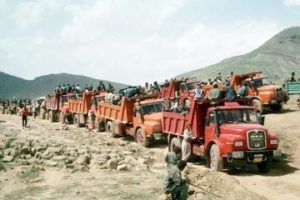 Through April 30, the Library has trial access to Border and Migration Studies Online, a collection of primary source documents, archives, films, and ephemera related to significant border areas and events from the 19th to 21st centuries. The materials were selected and are organized around themes such as border identities; border enforcement and control; border disputes; border criminologies; maritime borders; human trafficking; sea migration; undocumented and unauthorized migration; and global governance of migration. Geographic topics addressed include Mexico and the United States; EU and its Borders, Internal and External; Israel, Jordan, Lebanon, Palestine, and Syria; The Congo and its borders; Germany and its borders; Argentina and its borders; Canada and the United States; and Turkey and its borders.
Through April 30, the Library has trial access to Border and Migration Studies Online, a collection of primary source documents, archives, films, and ephemera related to significant border areas and events from the 19th to 21st centuries. The materials were selected and are organized around themes such as border identities; border enforcement and control; border disputes; border criminologies; maritime borders; human trafficking; sea migration; undocumented and unauthorized migration; and global governance of migration. Geographic topics addressed include Mexico and the United States; EU and its Borders, Internal and External; Israel, Jordan, Lebanon, Palestine, and Syria; The Congo and its borders; Germany and its borders; Argentina and its borders; Canada and the United States; and Turkey and its borders.
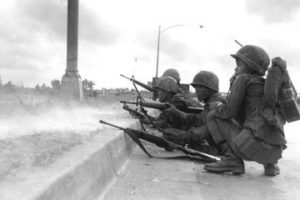 This trial also provides access to Security Issues Online, containing primary and secondary materials across multiple media formats and content types for each selected event, including Iran (1940s to the Present), 1960 U-2 Incident, World War II and Intelligence, Cold War: The Bay of Pigs and the Cuban Missile Crisis, 1961-1962, and more.
This trial also provides access to Security Issues Online, containing primary and secondary materials across multiple media formats and content types for each selected event, including Iran (1940s to the Present), 1960 U-2 Incident, World War II and Intelligence, Cold War: The Bay of Pigs and the Cuban Missile Crisis, 1961-1962, and more.
Resource: Oxford Research Encyclopedias: American History and Latin American History
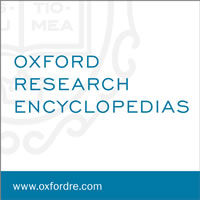 The Library has recently acquired the Oxford Research Encyclopedia of American History and the Oxford Research Encyclopedia of Latin American History, two online resources that provide peer-reviewed and regularly updated essays, as well as links to visual and primary source materials.
The Library has recently acquired the Oxford Research Encyclopedia of American History and the Oxford Research Encyclopedia of Latin American History, two online resources that provide peer-reviewed and regularly updated essays, as well as links to visual and primary source materials.
Never Forget? UC Berkeley’s Oral History Center documents memories of the Holocaust for researchers and the public
“It’s too late now because there’s nobody I can ask.”
— Katalin Pecsi, child of Auschwitz survivor
The 75th anniversary of the liberation of Auschwitz is on January 27 of this year and 41% of Americans don’t know what Auschwitz is — including a whopping two-thirds of millennials. A recent survey found a stunning lack of basic knowledge in the United States about the Holocaust — defined by the US Holocaust museum as “the systematic, state-sponsored persecution and murder of six million Jews” that decimated the Jewish population in Europe. Almost one million Jews were killed in Auschwitz alone, the largest and most infamous of the death camps. With fewer and fewer Jews who experienced the Holocaust first-hand alive to tell their stories — the youngest survivors with memories of the camps are in their eighties and nineties today — the cry of Holocaust remembrance not to forget depends on a clear historical record.
Throughout the Oral History Center’s vast collection of interviews are more than 200 that reference the Holocaust. While there is no specific Oral History Center (OHC) project dedicated to documenting the Holocaust, interviews can be found within projects about food and wine, arts and letters, industry and labor, philanthropy, and more. Furthermore, our oral history collections about the history of UC Berkeley include memories of the Holocaust and its impact, including projects about the Free Speech Movement, the student political party SLATE, and faculty interviews. These oral histories document memories of the Holocaust from a multiplicity of perspectives, from the first-hand experiences of Jewish refugees who fled from Europe before it was too late, to Americans who first heard about the atrocities after the liberation of the camps. The Jewish narrators in particular talk about how the Holocaust was the driving factor in their careers, philanthropy, Israel advocacy, and political activism. These oral histories may be particularly interesting to scholars as they provide a different lens for looking at the Holocaust, capturing the histories of those who were being interviewed for other reasons, but nonetheless spoke about the impact of the Holocaust on their lives.
There are oral histories in the collection that preserve the experiences of Jewish refugees who managed to flee Europe before it was too late and build new lives for themselves in the United States. Alfred Fromm fled Germany for the US in 1936 and went on to build a successful wine distribution business; he became a philanthropist supporting numerous educational, cultural, and Jewish organizations, including UC Berkeley’s Magnes Museum. In 1939, violinist Sandor Salgo had a sponsor in the United States but was denied a visa from the US consul in Hungary, who said the Hungarian quota was filled until 1984. In tears, Salgo told a patroness that he would probably die in a concentration camp and she was able to intervene on his behalf; his brother died in Auschwitz. Berkeley Mechanical Engineering professor and dean George Leitmann escaped Nazi-occupied Austria in 1940 at the age of 15, a few years later to return to Europe during WWII as a US Army combat engineer. He was in the second wave of soldiers who liberated Landsberg Concentration Camp, and later served as a translator during the Nuremberg War Crime Trials. All these experiences influenced his scientific area of study in control theory — measuring risk, probability, and how to avoid catastrophe.
“We certainly got there in time to see the smoldering bodies they were trying to burn and the skeletons. That probably hit me more than it hit the rest of the guys, because here my father was still missing. I still had hopes to see him among the DPs [displaced persons].” — George Leitmann on the liberation of Landsberg concentration camp. His father did not survive.
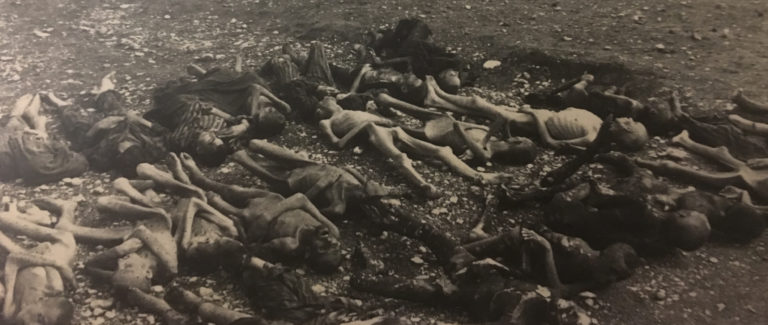
The one collection of interviews that addresses the Holocaust in the most detail is that of the the San Francisco Jewish Community Federation Leadership. Here can be found the oral history of William Lowenberg, a Holocaust survivor, number 145382 of the Auschwitz-Birkenau killing complex. His interview details how as a teenager luck, good health, and his own survival strategies enabled him to survive his harrowing journey through extermination camps, the Warsaw Ghetto aftermath, and a death march, until he was liberated from Dachau concentration camp at the age of 18. After an attempt to go home (like so many, his house had been taken over), Lowenberg eventually settled in San Francisco, where the Jewish Family Services Agency helped him secure a job collecting rent for a realty company. He went on to become a major figure in industrial real estate in the city. Lowenberg gave back to the agency later, serving on the same committee that helped him, in the 1970s finding jobs for Jewish refugees from the Soviet Union. Of his life dedicated to philanthropic and political activism on behalf of the Jewish community and Israel, Lowenberg reflected, “I feel that Jewish survival depends on the Jews.”
“I was young, healthy, and I kept clean. I kept as clean as I could all of the time.” — William Lowenberg on his survival strategies
The OHC collection also includes interviews of those who were present for the liberation, like Berkeley History Professor Emeritus Richard Herr, who was serving in the Signal Intelligence Corps and visited Buchenwald shortly after the liberation. He describes the displaced persons wandering the streets, survivors in their striped pajamas, the pile of dead bodies. “I was told they’d died after the liberation. They’d just been in such poor shape. They were just skin and bones. It was terrible.”
The collection also includes interviews of those who didn’t directly experience the Holocaust, but heard about it through family, friends, teachers, even work acquaintances. Oral histories are unique in that they can include off-hand comments and asides that illuminate an era. Six million — two thirds of Europe’s Jews perished — but three million survived and many dispersed to other countries including the United States. Narrators would encounter these survivors, the tales of depravity would sear in their memories, and the narrators would sometimes make offhand remarks. Other narrators provide more details about the many facets of the Holocaust — resistance and the underground, escapes, refugees and displaced persons, concentration camps, the murder of entire families — such as the oral histories of Laurette Goldberg, who taught music at UC Berkeley; Berkeley MBA Ronald Kaufman; wine writer Mike Weiss; winery manager Morris Katz; economist Lester Telser; poet Carl Rakosi, and Berkeley student activist Daniel Goldstine.

Among these are the oral histories of children of Holocaust survivors, including Berkeley History Professor Emerita Paula Fass, Paula Kornell, and Katalin Pecsi. All of them attributed their careers to their parents’ experiences. Growing up in Hungary, Katalin Pecsi knew her father had survived Auschwitz, her uncle Buchenwald, and her paternal grandmother Dachau; but had been told they were political prisoners because of their affiliation with the Communist Party. She later learned that she was Jewish, that her mother’s entire family had been killed in the Holocaust, and began to question what she had been told. “When I was a child I was told that they were political prisoners because they never told me that we were Jewish… but I’m not sure that’s true that they arrived as political prisoners. I don’t know, it’s too late now because there’s nobody I can ask.” Learning about her Jewish heritage combined with her longing to know about her own family propelled Pecsi into a career in Holocaust remembrance, becoming the director of education at the Budapest Holocaust Memorial Center.
“My parents were both survivors of the concentration camps. They had lost families. Not just their parents and siblings, but in fact, husbands, wives and children. They were married to other people, and my mother had a son who was taken from her when he was three. My father had four children who were all taken away and died in Auschwitz. One of the things that’s very, very clear is that I became a historian because of it. I became a historian because history was always around.” — Berkeley Professor Paula Fass
“What the concentration camp [Dachau] instilled in my father was just the beauty of life, and I think he helped to instill…was the beauty of a vineyard or of a vine growing, or beauty of your garden or the beauty of winemaking.” — Paula Kornell, winemaker
The OHC collection includes numerous oral histories that touch on narrators’ reactions to learning about the Holocaust. Interviewers for the Rosie the Riveter World War II Homefront Collection, for example, frequently asked narrators, who came from many walks of life, when did they first learn about the Holocaust and what was their reaction. Like Beatrice Rudney and Bud Figueroa, narrators interviewed for the Rosie the Riveter collection generally responded that they learned about the horrors of the genocide after the war, sometimes mentioning newsreels (films of piles of naked corpses, survivors of skin and bones). Other narrators, sitting for longer life-history interviews, addressed this issue when talking about their childhoods. Oral histories of Jewish narrators reveal more knowledge about what was happening during the war itself, particularly those whose families housed refugees, or who received letters from family with news of mass killings — 13 family members gone — or whose letters from family in Europe just stopped one day, such as former Dean of Berkeley Law School Jesse Choper, Professor Emeritus of Biochemistry and Molecular Biology Howard Schachman, Laurette Goldberg, Lester Telser, as well as Quaker activist Gerda Isenberg. Schachman observed, “I was certainly aware of what was going on to the Jews in Europe…. I doubted those people who claimed they weren’t aware of the Holocaust — it wasn’t called the Holocaust then.”
“I understood it during the war. There were always leaks of information of what was happening. Some people would escape from the concentration camps and come back and tell it.” — Jesse Choper, Dean Emeritus of Berkeley Law
The oral histories provide researchers with information about the range of feelings people had when they learned about the atrocities in the camps. Many of these are short responses to a direct question, such as in the Rosie the Riveter collection. Daniel Levin recalled a “sickening feeling;” DeMaurice Moses described being “inured to savagery by that time;” and as David Dibble remembered it, “You have to sort of genuflect and say, true, it was the worst thing that ever happened. And it was.” Some narrators recalled how other people talked about the Holocaust, and these interactions were indelible moments for them. Berkeley alumna and student activist Susan Griffin recalled an incident about four years after the war where her fellow Girl Scout Brownie troop members were laughing, saying Heil Hitler, and making the Nazi salute. She recalled the driver pulled over, emotional, and scolded that they must never do so again; and her grandparents, whom she described as “passive anti-Semites,” explained to the six-year-old “what an evil man Hitler was.” Berkeley History Professor Emeritus Larry Levine recalled being “shocked” when he was an undergraduate five years after the war ended, and an English professor told the class, “Don’t let the Jews tell you they are the only ones who have suffered.”
Some of the oral histories provide a glimpse into how the Holocaust affected Jewish Americans in the Baby Boom generation, living in its shadow. Berkeley alumna and student activist Julianne Morris, Adrienne Asch, and Wayne Feinstein recall how the Holocaust was something they always knew about, part of the culture. As Feinstein put it, “The first twenty or thirty years after the Second World War I think the Jewish community was in shock. And I grew up in that environment.” He described the Holocaust as “the primary motivation” for his lifelong dedication to Jewish education, cultural programs, and support for Israel.
“You couldn’t be a Jew in post-Holocaust America without knowing about the Holocaust. I mean, you grew up, you knew about the Holocaust, you knew about Israel.” — Adrienne Asch, disability rights activist and professor of bioethics
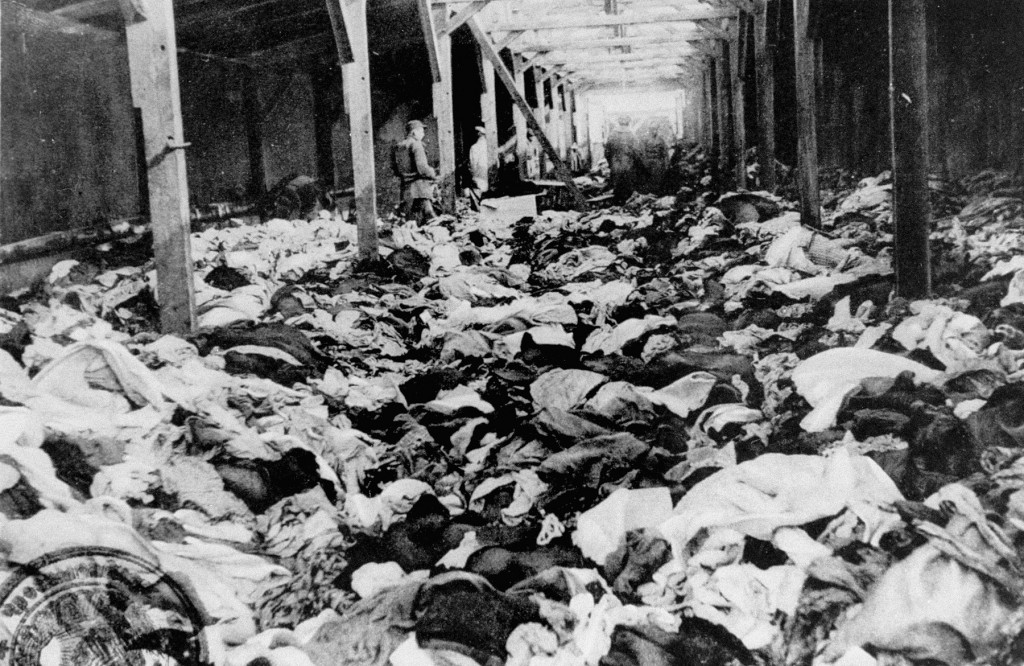
Finally, at least a few oral histories describe how narrators reacted upon visiting death camps as tourists years, even decades, after the end of the war. Through visiting these camps in person, these narrators came face to face with the scope of the horrors. Berkeley Economics Professor Emeritus and past director of the Institute of Industrial Relations, Lloyd Ulman, along with Marty Morgenstern, past director of Berkeley’s Center for Labor Research and Education, were taken to Auschwitz on a work trip to Poland. Ulman recalls how Morgenstern went outside and “put his head between his legs. He thought he was going to throw up or faint.” Ulman recalls “terrible things like seeing a whole collection of false teeth” [taken from the dead for their gold fillings] and feeling the “horror” that General Eisenhower had felt upon seeing the camps. Annette Dobbs also lived through the war but the enormity of the Holocaust really hit her when she visited Mauthausen Concentration Camp outside of Vienna in 1971. Expressing the sentiment of many of the narrators who spoke about the Holocaust, she said, “That day I made my own personal commitment to spend the rest of my life to see that nothing like that would ever happen to my people again.”
January 27, the date of the liberation of Auschwitz, is International Holocaust Remembrance Day.
Find these and all our oral histories from the search feature on our home page. You can search by name, key word, and several other criteria.
UC Berkeley Oral History Center: Jerry Brown Oral History
“Jerry Brown, I found, to be a man with a largely unwavering set of core values and principles who sometimes appears to choose contradictory ways in which to express those drives.”
— Director Martin Meeker, Oral History Center of The Bancroft Library, reflecting on his experience interviewing Jerry Brown
Inside the Jerry Brown Oral History
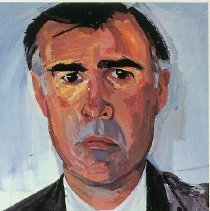
There are very few individuals who are what might be called a “shoe-in” for an Oral History Center life history interview. Governor Jerry Brown is one who easily qualifies. Brown’s career as an elected official began in Southern California in 1969 when he was elected to the Los Angeles Community College Board of Trustees and then continued for nearly the next fifty years through a succession of high offices; in 2018 he concluded his record fourth term as governor.
In forty hours of interviews, there are at least three main areas of study of the life of Jerry Brown, and politics much more broadly, that might be impacted by the contents of this interview from today’s vantage point: the historical trajectory of key social and political issues; the influence of creative and unique ideas upon Brown and his agenda; and what might be called the philosophy of realpolitik — of how politics really works, at least according to Brown.
The Jerry Brown oral history was made possible by funding from the State Government Oral History Program, A Project of the California Secretary of State, State Archives.
Dive Deeper
Dive deeper into the political life of Jerry Brown through the Jerry Brown oral history.
“20 Shades of Jerry Brown” UC Berkeley Podcast
“We had 20 interview sessions, and I would say that in those 20 interview sessions, we had 20 different shades of Jerry Brown,” explains Oral History Center Director Martin Meeker in UC Berkeley’s 9-minute Fiat Vox podcast, “Berkeley oral history project reveals 20 shades of Jerry Brown.” Get a taste of the oral history — hear Brown talk about the medfly invasion, Linda Ronstadt, and politics past and present. Martin Meeker provides insights into this “extraordinarily detailed, thoughtful, self-critical, broad, and sweeping oral history.”
Jerry Brown Interview History
For the historians at UC Berkeley’s Oral History Center, the question was not, “Should this interview be done?” but rather, “How might it be done at all?” Get the inside story about the making of this riveting 40-hour oral history from interviewer and Oral History Center Director Martin Meeker.
Governor Gray Davis Foreword to the Jerry Brown Oral History
When Gray Davis tried to have a hole in the governor’s rug repaired, Jerry Brown responded, “That hole will save the state at least $500 million, because legislators cannot come down and pound on my desk demanding lots of money for their pet programs while looking at a hole in my rug!” Find out why Gray Davis, the 37th Governor of the State of California, who served as chief of staff to Jerry Brown during his first two terms as governor (1975-1981), thinks Jerry Brown is one of the most consequential governors in California history.
California State Government Oral History Program
The Jerry Brown oral history is a part of the State Government Oral History Program and is the cornerstone of the re-launch of the program under California Secretary of State Alex Padilla. All of the oral history materials (recordings and transcripts) will be deposited with the California State Archives and available to users through their website as well.
Jerry Brown Oral History Transcript
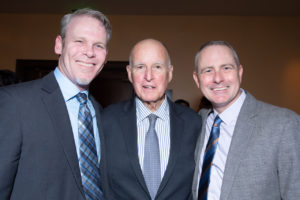
Read the transcript of the 40-hour oral history. In this oral history, the following topics are discussed at length: family background and upbringing; education, religion, and friendships; the political career of Pat Brown; college, seminary, and law school; California statewide elected offices, including Governor of California; campaigns for elected office, including for US President; election reform; taxation, budgets, and deficits; law, the courts, and criminal justice reform; immigration; the environment and climate change; education reform, charter schools, and higher education; Oakland, CA; popular culture, journalism, and political campaigns; political philosophy, theories of governance, and applied politics.
KQED Forum Podcast Featuring OHC Director Martin Meeker
Politics was the family business. The Democratic party was tribal for Brown. Listen as Oral History Center Director Martin Meeker, and KQED interview partners Scott Shafer and Guy Marzorati, talk about the unique political perspective and interviewing style of Jerry Brown.

KQED Podcast: The Political Mind of Jerry Brown
From KQED: The Political Mind of Jerry Brown brings listeners the wisdom of the former Governor, Mayor, and presidential candidate. The Oral History Center’s Martin Meeker and Todd Holmes, and KQED’s Scott Shafer, interviewed Brown for more than 40 hours, covering the former governor’s life and half-century in the political game – and Brown has some lessons he’d like to share. Premiering January 8 with hour-long episodes on KQED 88.5 FM every Wednesday at 8pm through January 29.
Find this interview and all our oral histories from the search feature on our home page. You can search by name, key word, and several other criteria.
Bancroft Roundtable: Thursday, February 20 at noon in the Lewis-Latimer Room of The Faculty Club (This event has passed.)
Brown, Behind the Scenes: Contending with Governor Jerry Brown and His Oral History
In this presentation, OHC historians Martin Meeker and Todd Holmes will provide the behind-the-scenes story of a remarkable interview with a singular Californian and offer an initial perspective on how this oral history might influence our understanding of California and its political culture.
OHC Director’s Column, November 2018
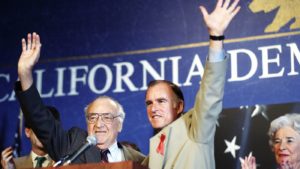
The Oral History Center is excited to announce that we have joined forces with local public radio station KQED on a significant new partnership. The occasion for this collaboration is a new oral history of four-term California governor Jerry Brown. The project is expected to encompass at least 30 hours of conversations with Brown, taking place over a series of months, beginning later this year. The interviews will span most of Brown’s adult life, including his time in the seminary, lessons learned from his father’s governorship, his terms as secretary of state, attorney general and governor of California, and mayor of Oakland, and three presidential bids. They will address a life lived in and out of the public eye, and a long and extraordinary career devoted to public service.
Research and interview duties will be shared by my colleague, Todd Holmes, and I. We’ll be joined by Scott Shafer, senior editor for KQED’s Politics and Government Desk and co-host of the weekly radio program and podcast Political Breakdown. “Jerry Brown is a singularly important figure in California political history,” Shafer says. “His long and remarkable time in and out of public life in California, including his personal reflections and insights, should be documented for posterity, and we’re delighted to be a part of doing just that.”
The final interviews will join our collection of political oral histories, which include major interview projects on four earlier California governors, including Jerry’s father Pat Brown, who was elected in 1958 and again in 1962. Transcripts and audio and video of the Brown interviews will be made available on our website. We are thrilled to partner with KQED to see that Governor Brown’s oral history is completed and made available to everyone — and we are humbled to be the ones with the honor of making sure that this history is recorded and preserved.
Like all Oral History Center projects, we are obliged to raise funding to help support this endeavor as neither the state or the university will provide funding this extraordinarily important project. We are happy to accept donations large and small for those who agree that this oral history needs to be recorded and that we cannot miss this window of opportunity to get it done. Please contact me directly (mmeeker@berkeley.edu or 510-643-9733) with questions or think about making a donation online: http://ucblib.link/givetoOHC
Martin Meeker, @MartinDMeeker
Charles B. Faulhaber Director
Oral History Center
From the Oral History Center Director – OHC and Education
For an office that does not offer catalog-listed courses, the Oral History Center is still deeply invested in — and engaged with — the teaching mission of the university.
For over 15 years, our signature educational program has been our annual Advanced Oral History Summer Institute. Started by OHC interviewer emeritus Lisa Rubens in 2002 and now headed up by staff historian Shanna Farrell, this week-long seminar attracts about 40 scholars every year. Past attendees have come from most states in the union and internationally too — from Ireland and South Korea, Argentina and Japan, Australia and Finland. The Summer Institute, applications for which are now being accepted, follows the life cycle of the interview, with individual days devoted to topics such as “Project Planning” and “Analysis and Interpretation.”
In 2015 we launched the Introduction to Oral History Workshop, which was created with the novice oral historian in mind, or individuals who simply wanted to learn a bit more about the methodology but didn’t necessarily have a big project to undertake. Since then, a diverse group of undergraduate students, attorneys, authors, psychologists, genealogists, park rangers, and more have attended the annual workshop. This year’s workshop will be held on Saturday February 3rd and registration is now open.
In addition to these formal, regularly scheduled events, OHC historians and staff often speak to community organizations, local historical societies, student groups, and undergraduate and graduate research seminars. If you’d like to learn more about what we do at the Center and about oral history in general, please drop us a note!

In recent years we have had the opportunity to work closely with a small group of Berkeley undergrads: our student employees. Although the Center has employed students for many decades, only in the past few years have they come to play such an integral role in and make such important contributions to our core activities. Students assist with the production of transcripts, including entering narrator corrections and writing tables of contents; they work alongside David Dunham, our lead technologist, in creating metadata for interviews and editing oral history audio and video; and they partner with interviewers to conduct background research into our narrators and the topics we interview them about. With these contributions, students have helped the Center in very real, measurable ways, most importantly by enabling an increase in productivity: the past few years have been some of the most productive in terms of hours of interviews conducted in the Center’s history. We also like to think that by providing students with intellectually challenging, real-world assignments, we are contributing to their overall educational experience too.
As 2017 draws to a close, I join my Oral History Center colleagues Paul Burnett, David Dunham, Shanna Farrell, and Todd Holmes in thanking our amazing student employees: Aamna Haq, Carla Palassian, Hailie O’Bryan, Maggie Deng (who wrote her first contribution to our newsletter this issue), Nidah Khalid, Pilar Montenegro, Vincent Tran, and Marisa Uribe!
Martin Meeker, Charles B. Faulhaber Director of the Oral History Center
From the Oral History Center Director: Martin Meeker, our New Director, Recalls His First Interview
Recently I was asked, “What was the first interview you conducted?” After a moment mentally scanning through college and grad school research projects, I realized that I undertook my first proper interview years earlier, when I was a junior at St. Francis High School in Mountain View, California. Entirely out of step with my Catholic school education, I choose to write my junior year research paper on that recently departed rock ‘n roll alien David Bowie.
The teacher insisted that we conduct an interview “with a real expert” as part of the research process. Not being the most ambitious student, I was at a loss: who did I know that might qualify as an expert? A friend of a friend was a die-hard fan, but even then I knew that choice wouldn’t win me any rave reviews. I had been reading a recently published biography of Bowie and resolved to try to locate the author, Jerry Hopkins. I sent a note and then called his New York publisher a few times. Finally I got someone on the line and asked, “Can I have Jerry Hopkins’s contact info? I want to interview him.” The voice on the line hesitated and said something like, “Oh, Mr. Hopkins. He lives in Hawaii. But we cannot give out contact information for our authors. Please send us a note and we’ll forward it to him.”
In hindsight I suspect that deadlines were looming and I certainly knew mail was slow. Armed with that one vague piece of information, I called information in Hawaii and, sure enough, there was a Jerry Hopkins of Honolulu listed. I called and left a message, explaining my project (and hoping that this was the correct Mr. Hopkins). A few days later, Hopkins kindly returned my call. At the beginning of what I remember to be a long and substantial conversation, I admitted that I was incredibly nervous. Hopkins was kind, telling me that he “still gets anxious” when doing interviews. With those reassuring words, I immediately found my footing and I began my first interview.
Yes, I enjoyed the experience of discussing Bowie with a bona-fide expert, but never did I imagine that interviewing would become my career — my vocation. I arrived at the Oral History Center (then known as the Regional Oral History Office) as a postdoctoral fellow in July 2003 and then a year later began as a historian/interviewer. Since that time I’ve had the opportunity to work of many, varied projects — from Kaiser Permanente to federal fiscal policy — and interviewed well over 100 individuals (many for long, life-history interviews of a dozen hours or more). The experience of conducting these interviews has taught me much about scores of different topics. Perhaps what has become clearest to me through the years is simply how much I enjoy the interview process, hearing different stories, and doing my best to get people to think about their own lives and contributions in sometimes new and unique ways. So, now I get the opportunity to lead the place that has given me so much.
In the months ahead I will begin to lay out my agenda for the coming years (in this newsletter and on our blog), but for now I just want to thank those who have supported me — and the Oral History Center — up to this point and invite you to join me in looking ahead to the next chapter. My office is always open to people who want to engage with us, learn more about interviewing, or just talk history.
And in closing I want to offer my sincere and profound gratitude to Neil Henry, the outgoing director of the Oral History Center. Neil came aboard at a particularly challenging time for the office and provided sage leadership, always with good humor and a gentle touch. I learned a lot from him over the past few years and wish him the best in his well-earned retirement. Thanks, Neil!
Martin Meeker
Charles B. Faulhaber Director of the Oral History Center